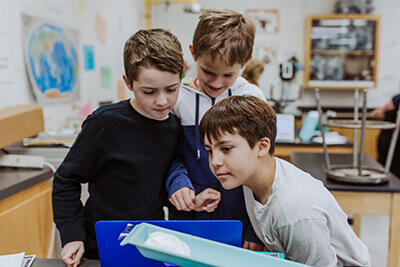February 20, 2020
 by Dr. Bill Hudson, Head of School
by Dr. Bill Hudson, Head of School
My mother had cataracts surgery today. Although I’ve known about the condition for years, I found myself researching its causes and treatment, happy to find that the procedure is both common and safe. In conversations with my mother, I asked how it affected her and the way she sees the world, the challenges she faces navigating her daily routine, and the limitations of poor sight. I am grateful for the doctors, nurses, and healthcare workers who care for my mother so that she can once again see the world with clarity.
I have long believed that the power of education is to help young people see the world in new ways. Inspiring literature, the beauty of mathematics, the magnificence of science, and the beauty and depth of the arts, provide students multiple ways of seeing themselves, others, and the world around them. Education is much more complex than simply imparting knowledge and skills. It is accompanying students through a challenging and sometimes uncomfortable process of fostering a growing awareness of themselves and their own agency.
I am reminded of the fable of the elephant and the six blind men that tells the tale of how the men “see” the elephant. As one touches its trunk, he exclaims that the elephant is like a snake. Another, upon touching one of its legs, sees the elephant as like a tree. Feeling a tusk, one likens it to a spear while one who feels the ear believe the elephant to be like a fan, and so on. The story implies that one’s subjective experience can be true, but that such experience is inherently limited by its failure to account for other truths or a totality of truth. It calls for a need for deeper understanding and a respect for different perspectives on the same object of observation. It is an appreciation and an enabling of ways of seeing.
Late last week, an MPA parent forwarded me a link to the latest column of New York Times writer and author David Brooks. In it, Brooks referred to the German word, “Bildung” that is used in Scandinavian countries to describe their approach to education. He writes, “Today, Americans often think of schooling as the transmission of specialized skill sets—can the student read, do math, recite the facts of biology. Bildung is devised to change the way students see the world. It is devised to help them understand complex systems and see the relations between things—between self and society, between a community of relationships in a family and a town.”
To me, Bildung could very well be used to describe an MPA education. Our “whole child for whole life” approach is built upon the conviction that students must be architects of their own learning, where they take risks, utilize innovative tools in both expected and unexpected way, demonstrate knowledge across and between disciplines, and come to view the world through multiple lenses. To empower students to live, learn, and thrive in today’s 21st century globalized society does indeed require new ways of seeing.